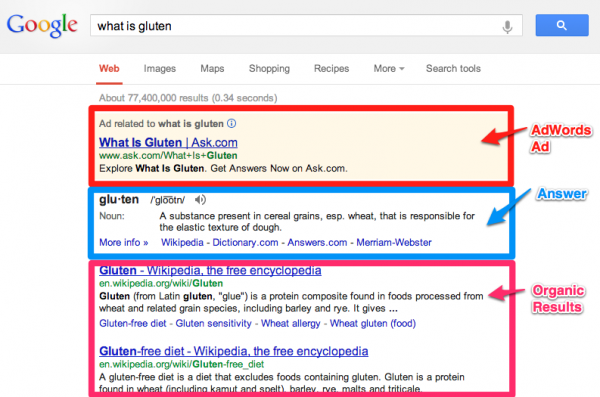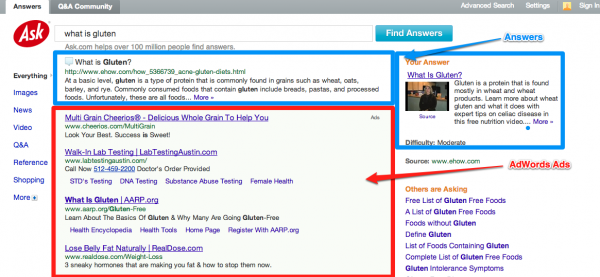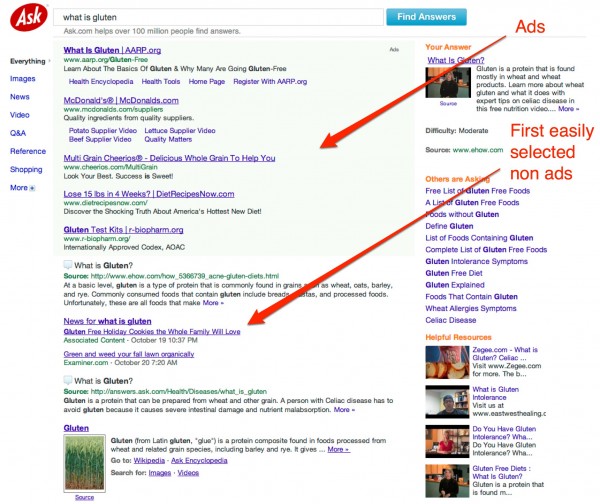Is Ask.com Continuing To Play The Google Arbitrage Game?
We recently received an email from a reader who’d made an inquiry with Google AdWords support. Why, this reader had asked, is Ask.com allowed to buy AdWords and rank for certain surprising terms, when its landing page features mostly ads above the fold? Doesn’t that violate Google’s policies on arbitrage? All About Arbitrage Arbitrage, when […]

We recently received an email from a reader who’d made an inquiry with Google AdWords support. Why, this reader had asked, is Ask.com allowed to buy AdWords and rank for certain surprising terms, when its landing page features mostly ads above the fold? Doesn’t that violate Google’s policies on arbitrage?
All About Arbitrage
Arbitrage, when it comes to Google AdWords, is when a advertiser hopes it can buy traffic from Google for less than it makes off ads on its own site.
In other words, say a company buys an ad for $0.60 per click on Google. Visitors click on that ad, come to the advertiser’s site where they click on a ad there — maybe even an ad that’s part of the Google ad network — and generate $1 per click. The advertiser has earned a tidy $0.40 in profit.
Google doesn’t like arbitrage because it’s annoying for its searchers. As Google’s policy against arbitrage says:
One example of this kind of prohibited behavior is called arbitrage, where advertisers drive traffic to their websites at low cost and pay for that traffic by earning money from the ads placed on those websites. We’ve created this policy to help ensure that users see useful, unique, and original content without excessive advertising.
It makes sense. Who wants to click on ad at Google, then show up on a page that seems designed just to show a bunch of other ads? But that’s the situation that does happen with some ads that Ask.com runs on Google.
It’s something we’ve seen before on Ask, as we covered in our Ask.com Plays The Google AdWords Arbitrage Game in 2008. Back then, Ask said it was an “isolated incident” down to its search marketing agency. But nearly four years later, it can feel like arbitrage has returned.
Ask’s Ads
Consider these Google results for a search on “What is gluten?”
The results are topped by an ad from Ask, promising “Get Answers Now on Ask.com,” like this:

In the example above, the first listing (marked as “Answers”) isn’t easily clicked on. The “What is Gluten” title isn’t a link, as with regular search listings. The only way to get to that answer is if you use the “More” link at the end of the page description:
Under this comes a big block of ads, the first listings that are more easily clicked upon. Sometimes, these ads even come before the answers:
Similar situations happen for a range of searches, such as “What is Celiac disease?” and “What is Aspergers syndrome?”
From Google Ad To Google Ad
The ads themselves all come from Google. Ask is part of Google’s ad network. That means Ask has purchased ads on Google for “what is gluten,” then shows a page with ads for “what is gluten.” How’s Ask making money off of that?
One answer is that Ask is likely buying the ads more cheaply on Google than other advertisers, perhaps because it has a long account history that helps its overall quality score. Another issue is that it might be carrying ads that aren’t targeting the word gluten expressly — and so which might be more expensive that those going after that term specifically.
Consider the ads for both McDonald’s and Cheerios that appear. Neither leads to landing pages that have anything to do with gluten:
AdWords Rep: It’s Not Arbitrage, Because Ask.com Is A Google Product
Our reader asked a Google AdWords support rep about the situation and got a surprising response that this was allowed because Ask.com is a “Google product” and because as a search engine, it’s fine for Ask to drive people to a search results page that includes both ad and regular unpaid “organic” listings:
After consulting with a policy specialist, I’ve found that Ask.com is not in violation of any policies. Since Ask.com is considered a Google product, they are able to serve ads at the top of the page when the search query is found to be relevant to their ads. For example, if you search for “adwords” in a Google search, an ad for www.google.com/AdWords will always appear at the top of the results.
As far as the landing page being in violation of arbitrage policy, this is not the case due to Ask.com being a search engine. Like Google.com, Ask.com has relevant ads to the search terms displayed at the top of the page, and organic search results displayed below. I understand how you could interpret this in a sense of arbitrage, but it is not the case.
Google PR: No Special Treatment For Ask
When we contacted Google’s PR department, it said the email was a mistake. Ask isn’t considered a Google product, even though Ask has a deal to syndicate Google AdWords and “other search-related services.”
Google said Ask gets no special treatment (nor does any other search partner). Beyond that, the company wouldn’t comment on specific Ask.com AdWords creatives. Since we brought up a number of the examples last week, and they are still appearing as of this writing, that suggests that Google doesn’t view them as violating its arbitrage policy.
Ask.com: We’re Providing A Service
Ask.com also said it was getting no special treatment and that its ads were leading to useful ad-supported information.
“We’re clearly a service that uses advertising to monetize our site, but the only way that we make advertising work is when people come back to our site,” Doug Leeds, CEO of Ask.com told me.
Leeds wouldn’t get into the details of whether Ask.com is — deliberately or not — benefiting from an arbitrage-like situation. He did say the company’s goal is to get visitors to stay and come back, rather than click on an ad and leave.
“Our business model depends on people who come to us from Google coming back again, or else it doesn’t work,” he said.
Related stories
New on Search Engine Land





